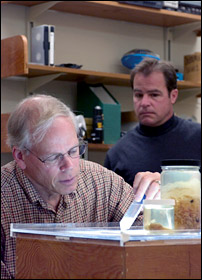
|
 |
Research > Ocean
Institutes > Ocean Life Institute
Ocean Life Institute
 |
 |
| Institute
Director Laurence Madin (left) examines a salp specimen
preserved for genetic analysis, with Research Associate
Erich Horgan. (Photo by Tom Kleindinst) |
The Ocean Life Institute (OLI) fosters new research on important biological and ecological
questions in the ocean. In 2003, the OLI supported a range of new fellows, projects, scientific meetings, and research initiatives under its three broad themes: biodiversity, ecosystem structure and sustainability, and new tools.
Cabell Davis and Heidi Sosik from the Biology Department were appointed new OLI fellows, joining three others continuing from 2001. Davis will work to integrate advanced optical, genetic, and robotic technologies into autonomous instruments that can survey and identify zooplankton in the ocean. Sosik’s fellowship, jointly sponsored by OLI and the Coastal Ocean Institute, will allow her to focus on new approaches
to understanding the dynamics of phytoplankton
populations in coastal waters.
The OLI appointed a new postdoctoral scholar, Tim Verslycke, who will study genetic and molecular aspects of toxicology in marine animals. New OLI grants to WHOI investigators include those for a demographic
study of albatross populations;
age measurements of deep-sea corals; and finding new ways to retrieve bacterial samples from the bottom of the ocean.
In July, OLI hosted a workshop, “The Next Generation of In Situ Biological and Chemical Sensors in the Ocean.” Cosponsored by the Deep Ocean Exploration Institute, the National Science Foundation, and the Office of Naval Research, this meeting brought together 160 investigators from many fields of science, engineering, government, and Ocean Life Instituteindustry to brainstorm on new technologies and possibilities
for sensors and instruments in the sea.
Research initiatives are an important mechanism
to focus OLI’s work on pressing problems. The OLI Right Whale Research and Conservation Initiative got its official start with an Ocean Forum in November that brought together an array of experts from several institutions and scientific fields to chart a course for timely and practical research to help save this highly endangered species. A second program,
the Coral Reef Connectivity and Conservation Initiative, has begun planning a program that will marry advanced WHOI science and technology to international conservation efforts in the Caribbean. Our developing partnership with the Liquid Jungle Laboratory, a new tropical field station in Panama, blossomed during the year, and the first WHOI scientists
will visit the lab in early 2004.
—Laurence Madin (lmadin@whoi.edu)
Ocean Life Institute Director
|
|
